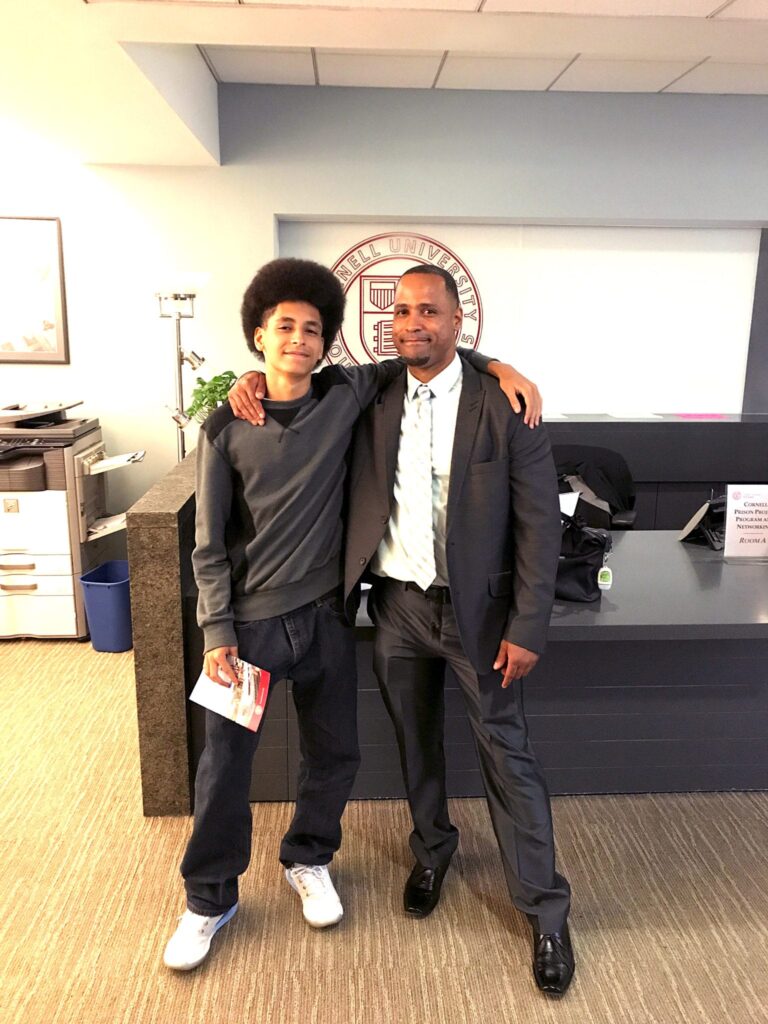Higher Education Behind and Beyond Bars: A Father and Son Story
I sat with my back pressed into cold, hard wood as I stared into the big brown eyes across the table. He looks so much like me, I thought. Eight…

I sat with my back pressed into cold, hard wood as I stared into the big brown eyes across the table. He looks so much like me, I thought. Eight years old and full of hope — the tendrils of my incarceration have yet to grab hold of him. I asked, “Lil’ Dee, what do you want to do when you grow up?” He looked at me and said confidently, “Dad, I want to go to college. I want to get a good job and get Mommy a house.”
My son’s words struck me and underscored a responsibility I had that prison could not eradicate. If I wanted better for my son, if I wanted him to realize his dreams, then I had to change. I had to model the very man that I could have been on the outside. I decided that I would do everything I could to grow intellectually, emotionally, and spiritually.
In March 2000, my brother Darnell and I began serving a 17-year-to-life sentence. We never knew if we would get out, but we were determined to make a positive contribution to our family despite being incarcerated. We exhausted every academic and vocational resource Department of Corrections and Community Supervision had to offer, but higher education was not available. A few other prisons had college programs but they were privately funded. Also, there was no guarantee that we would ever get transferred to these facilities.
Finally, in 2012, an opportunity of a lifetime arose. Hobart and William Smith College offered accredited classes. Then in 2016, Cornell University initiated a fully funded associate degree program at our facility. There were only 15 seats for the program and over 300 applicants. So Darnell and I were ecstatic when we were accepted. College in prison gave me an academic and moral credibility that was fundamental in maintaining a nurturing relationship with my son. I was able to call him and talk about the quadratic equation, male masculinity in the Middle Ages, and even Plato’s Allegory of the Cave, among other things.
In 2017, Darnell and I were released. On the way out, I heard the gates clank closed behind me as the sunlight, freedom, hope, and purpose invigorated me. Immediately, for the first time ever outside a prison visiting room, I was engulfed in a warm embrace by my now teenage son as he said, “Dad this a new chapter.” Surely it is.
My brother, my son, and I have continued our pursuit of our college degrees. At the time of my release, my son was a senior in high school and about to attend Thompkins Cortland Community College. Darnell eventually became a full-time student at Cornell University, and I went on to earn my associate degree at Cayuga Community College while studying as a Justice in Education Scholar at Columbia University. I never thought I was college material and believed that incarceration had destroyed that dream. But, two years later, here I am today with my son. I look across the table and see those same big brown eyes and ask him if he is willing to share what pursuing his long sought-out dream has meant, and this is what he said:
Honestly, I never really saw myself as college material. I did not like school so I couldn’t see myself getting to that level of education. But seeing my dad’s success in college despite the hardships he had gone through had altered my perception of my abilities. I felt that if he was able to succeed as well as he did with the limited resources he had, then I could definitely reach that level of success myself.
Seeing his success showed me that despite whatever hardships or obstacles may be in my way, hard work and dedication will always prevail. My Uncle Darnell’s love and understanding for the law always intrigued me. I was amazed at how far he had come even though he entered prison at 20 without a G.E.D. I realized that if I apply myself correctly, I will be able to succeed just as well as they have. My enrollment in Thompkins Cortland Community College was the first step in pursuing what not too long ago seemed an eight-year-old’s impossible dream.
Getting a degree is important to me. Higher education will provide career options and opportunities which will enable me to make a valuable contribution to my family and society as a whole. I want to set a positive example for my family. I’m the oldest of all my siblings and cousins. I want to lead in the right steps to encourage the rest of my family that they could earn a degree as well. Nothing would make me happier than to be able to help the younger ones the way my dad had helped me. My family and so many others have supported me through this process and helped me get this far. This degree is just as important to me as it is to them. Making my parents and family proud makes it even better; it just adds fuel to the fire and makes me want to do great for myself and everyone else.
With my heart swelling with joy, love, and admiration, I said, “Son, you have already made us proud. Continue living your dream.”
Ed Trust believes Darryl’s story is just one example of why Congress needs to lift the ban on Pell Grants for incarcerated students.